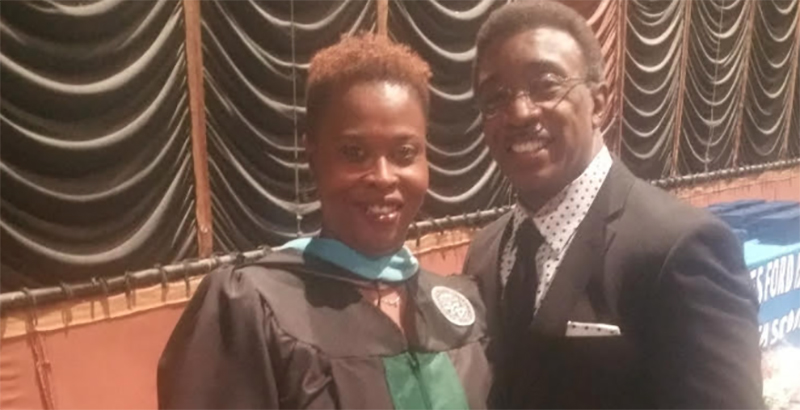Giving Back, Principal Delivers a Chance to Succeed

This is one of eight profiles in Displaced: The Faces of American Education, a package from The 74 following the stories of the diverse characters who are a part of the American education system, and how the COVID-19 crisis has upended their lives in a few short weeks. Meet the others, from around the country, here.
For several days in April, Shaunamichelle Leonard packed dozens of computers into her Kia Sorrento, donned a mask and gloves, grabbed a bottle of hand sanitizer and plotted out a path to student homes on her GPS to deliver them.
“I was just trying to do what was right,” the New Tech West High School principal said. “I was armed with everything I needed, and I just wanted to make sure these kids got what they needed.”
The coronavirus forced the Cleveland school district to shutter schools March 13, and Leonard’s school passed out laptops April 8 to keep students connected through distance learning. As a product of that very district and as the first in her family to graduate from high school and college, Leonard, 48, is all too familiar with the challenges her students face.
She knew work and child care schedules or lack of transportation could keep families from picking up the laptops that the school was handing out. So she was not surprised when a stack of nearly 30 laptops, set aside for individual students, were still unclaimed.
That wouldn’t do.
She wanted to show her students in the small close-knit school that she cared and wanted them to succeed.
“It was beautiful to see them,” Leonard said. “They were like, ‘Oh my God, Ms. Leonard, thank you so much,’ and it just put a smile on their face and a smile on my face.”
And she had a reminder for them: “Now you have what you need to be successful,” she told her students, “there are no excuses and I need you to do what you need to do, which is finish your work.”
Her students are like family, Leonard said, which is what made it easy for her to risk infection by visiting homes to deliver laptops. It also led her to go a step further and deliver about $100 worth of groceries to each of two immigrant families struggling in the first days of Ohio’s shutdown, to last until she could connect them with other services.
“It’s just about … humanity … doing what’s right,” she said. “You can’t leave these kids that come to your school hungry. You know, some kids come to school and they get two meals a day and that’s all they get. To have these kids at home for an indefinite amount of time, I wanted them to have enough to at least [hold] them over.”
The closeness at the school is affected by the separation, Leonard said, though she emails her 57 graduating seniors every day or every other day to keep in touch and make sure they complete everything they need to receive their diploma.
That’s partly because the district made sure that the chance for seniors to graduate was a top priority during the closure and partly because she feels closer to the graduating class because they each joined the school at the same time, her as principal and them as freshmen. Their inability to have a regular graduation ceremony this year — graduation is now a drive-through in which students pick up diplomas in family cars — also hurts her.
“I have grown to love them and they are good kids,” Leonard said. “They have worked so hard for their special moment and they feel cheated.”
Leonard said she wants to repay all the guidance and kindness she found as a child at school in Cleveland and at high school in East Cleveland, a suburb on Cleveland’s border with even more concentrated poverty than the city of Cleveland.
“No matter what you’re born into, you have the ability to determine what your future will be,” Leonard said. “That is what I got from my teachers at Cleveland, East Cleveland and principals in both. They inspired me.”
Loenard joined New Tech West three years ago, a small, specialized high school of 275 students that uses the national New Tech model, combining work on computers with student projects. Rather than teaching students through lectures, New Tech schools have students complete multidisciplinary projects that make them learn skills needed for the task.
Student test scores have improved under Leonard, and the school’s sense of community has grown.
“Because we are small, everyone knows everyone,” she said. “I know every student by name, and kids know that.”
The sense of community and her efforts caused parents and students to fight for the school when the district considered shutting it down late last year because of its size.
That passion convinced the school board to keep the school going. The students and staff celebrated with a cake that read, “Congratulations Scholars. We did it together.”
Like most everyone now, Leonard wants to return to classes at the school as soon as possible, while also knowing that safety might force separation again.
“I don’t know what the future holds,” she said. “No one does. I’m just hopeful. I know either way, whether we’re in person together or doing distance learning, we will be a family.”
Get stories like these delivered straight to your inbox. Sign up for The 74 Newsletter

;)
